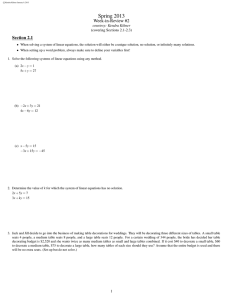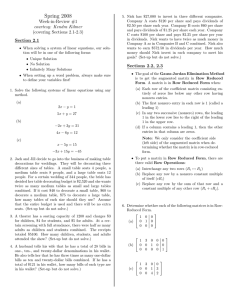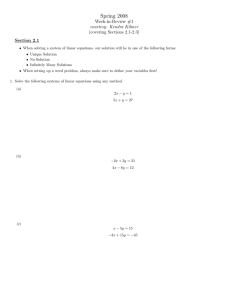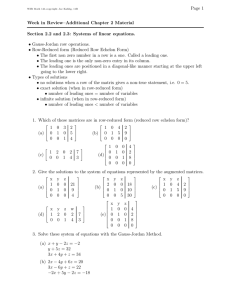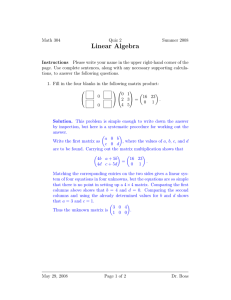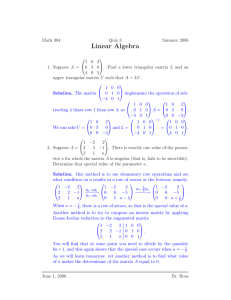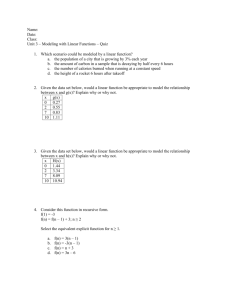Document 10502960
advertisement
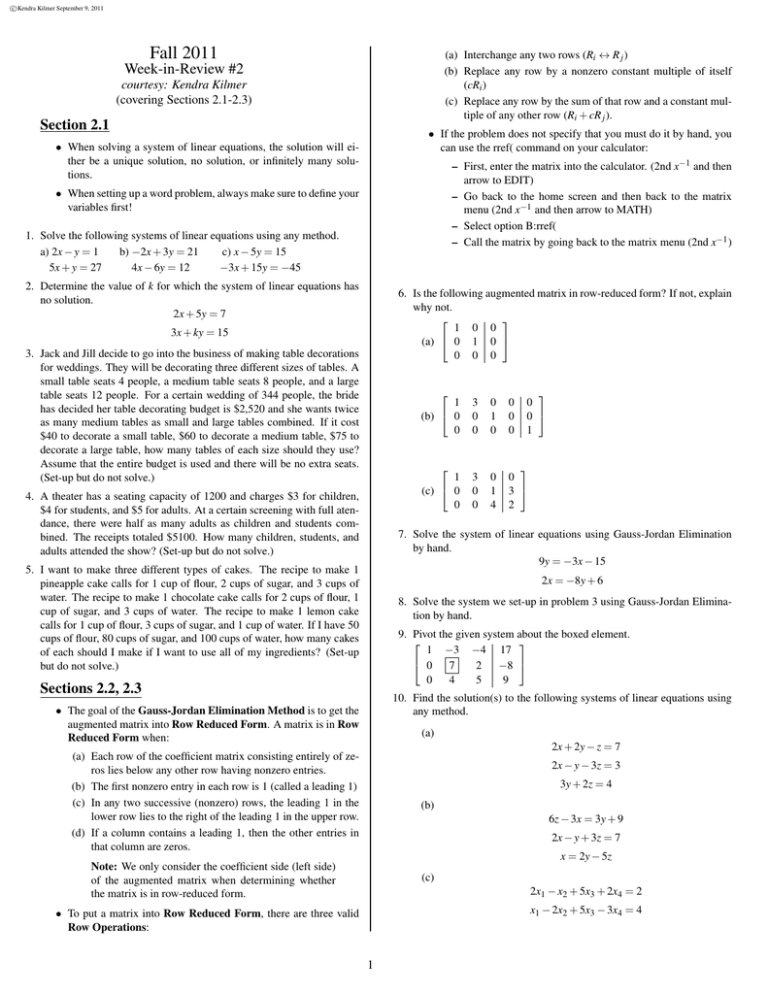
c Kendra Kilmer September 9, 2011 Fall 2011 (a) Interchange any two rows (Ri ↔ R j ) (b) Replace any row by a nonzero constant multiple of itself (cRi ) (c) Replace any row by the sum of that row and a constant multiple of any other row (Ri + cR j ). Week-in-Review #2 courtesy: Kendra Kilmer (covering Sections 2.1-2.3) Section 2.1 • If the problem does not specify that you must do it by hand, you can use the rref( command on your calculator: • When solving a system of linear equations, the solution will either be a unique solution, no solution, or infinitely many solutions. – First, enter the matrix into the calculator. (2nd x−1 and then arrow to EDIT) – Go back to the home screen and then back to the matrix menu (2nd x−1 and then arrow to MATH) – Select option B:rref( – Call the matrix by going back to the matrix menu (2nd x−1 ) • When setting up a word problem, always make sure to define your variables first! 1. Solve the following systems of linear equations using any method. a) 2x − y = 1 b) −2x + 3y = 21 c) x − 5y = 15 5x + y = 27 4x − 6y = 12 −3x + 15y = −45 2. Determine the value of k for which the system of linear equations has no solution. 2x + 5y = 7 6. Is the following augmented matrix in row-reduced form? If not, explain why not. 1 0 0 (a) 0 1 0 0 0 0 3x + ky = 15 3. Jack and Jill decide to go into the business of making table decorations for weddings. They will be decorating three different sizes of tables. A small table seats 4 people, a medium table seats 8 people, and a large table seats 12 people. For a certain wedding of 344 people, the bride has decided her table decorating budget is $2,520 and she wants twice as many medium tables as small and large tables combined. If it cost $40 to decorate a small table, $60 to decorate a medium table, $75 to decorate a large table, how many tables of each size should they use? Assume that the entire budget is used and there will be no extra seats. (Set-up but do not solve.) 3 0 0 0 1 0 0 0 0 3 0 0 0 1 4 0 3 2 1 (b) 0 0 1 (c) 0 0 4. A theater has a seating capacity of 1200 and charges $3 for children, $4 for students, and $5 for adults. At a certain screening with full atendance, there were half as many adults as children and students combined. The receipts totaled $5100. How many children, students, and adults attended the show? (Set-up but do not solve.) 0 0 1 7. Solve the system of linear equations using Gauss-Jordan Elimination by hand. 9y = −3x − 15 5. I want to make three different types of cakes. The recipe to make 1 pineapple cake calls for 1 cup of flour, 2 cups of sugar, and 3 cups of water. The recipe to make 1 chocolate cake calls for 2 cups of flour, 1 cup of sugar, and 3 cups of water. The recipe to make 1 lemon cake calls for 1 cup of flour, 3 cups of sugar, and 1 cup of water. If I have 50 cups of flour, 80 cups of sugar, and 100 cups of water, how many cakes of each should I make if I want to use all of my ingredients? (Set-up but do not solve.) 2x = −8y + 6 8. Solve the system we set-up in problem 3 using Gauss-Jordan Elimination by hand. 9. Pivot the given system about the boxed element. 1 −3 −4 17 0 7 2 −8 0 4 5 9 Sections 2.2, 2.3 10. Find the solution(s) to the following systems of linear equations using any method. • The goal of the Gauss-Jordan Elimination Method is to get the augmented matrix into Row Reduced Form. A matrix is in Row Reduced Form when: (a) 2x + 2y − z = 7 (a) Each row of the coefficient matrix consisting entirely of zeros lies below any other row having nonzero entries. (b) The first nonzero entry in each row is 1 (called a leading 1) (c) In any two successive (nonzero) rows, the leading 1 in the lower row lies to the right of the leading 1 in the upper row. (d) If a column contains a leading 1, then the other entries in that column are zeros. (b) Note: We only consider the coefficient side (left side) of the augmented matrix when determining whether the matrix is in row-reduced form. (c) 2x − y − 3z = 3 3y + 2z = 4 6z − 3x = 3y + 9 2x − y + 3z = 7 x = 2y − 5z 2x1 − x2 + 5x3 + 2x4 = 2 x1 − 2x2 + 5x3 − 3x4 = 4 • To put a matrix into Row Reduced Form, there are three valid Row Operations: 1
